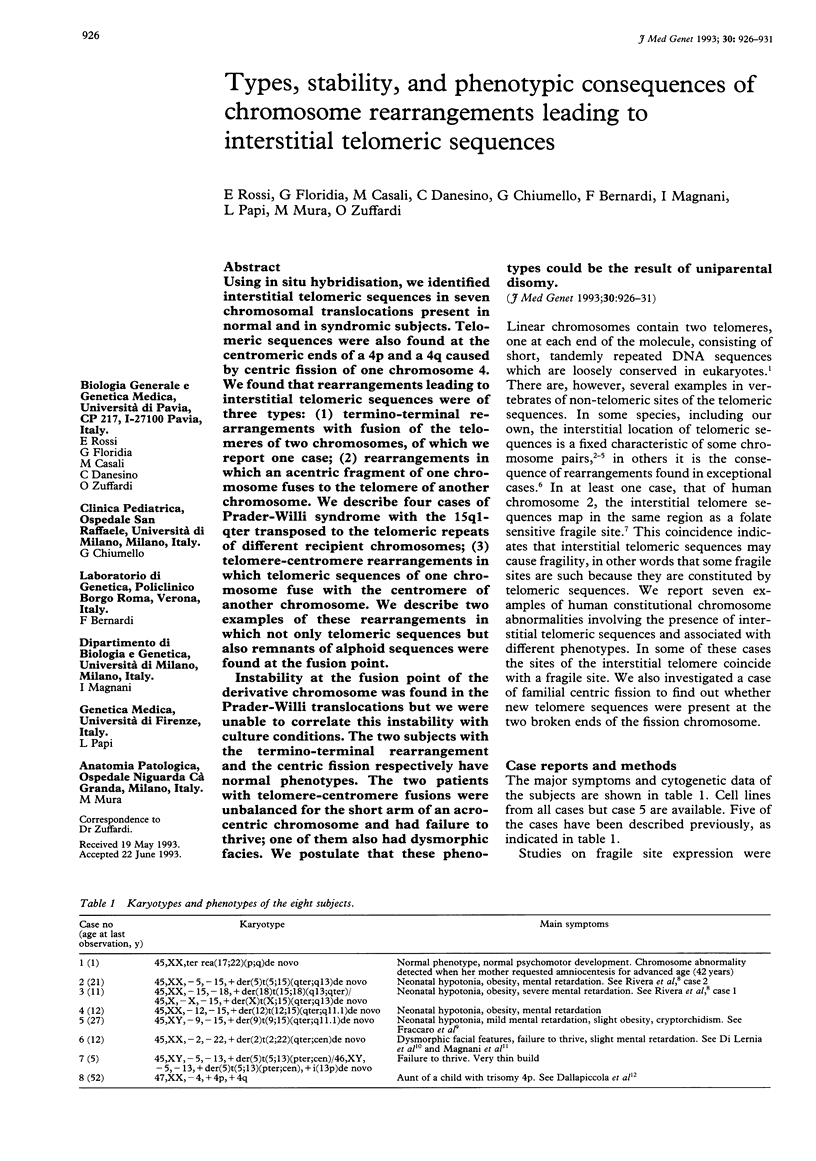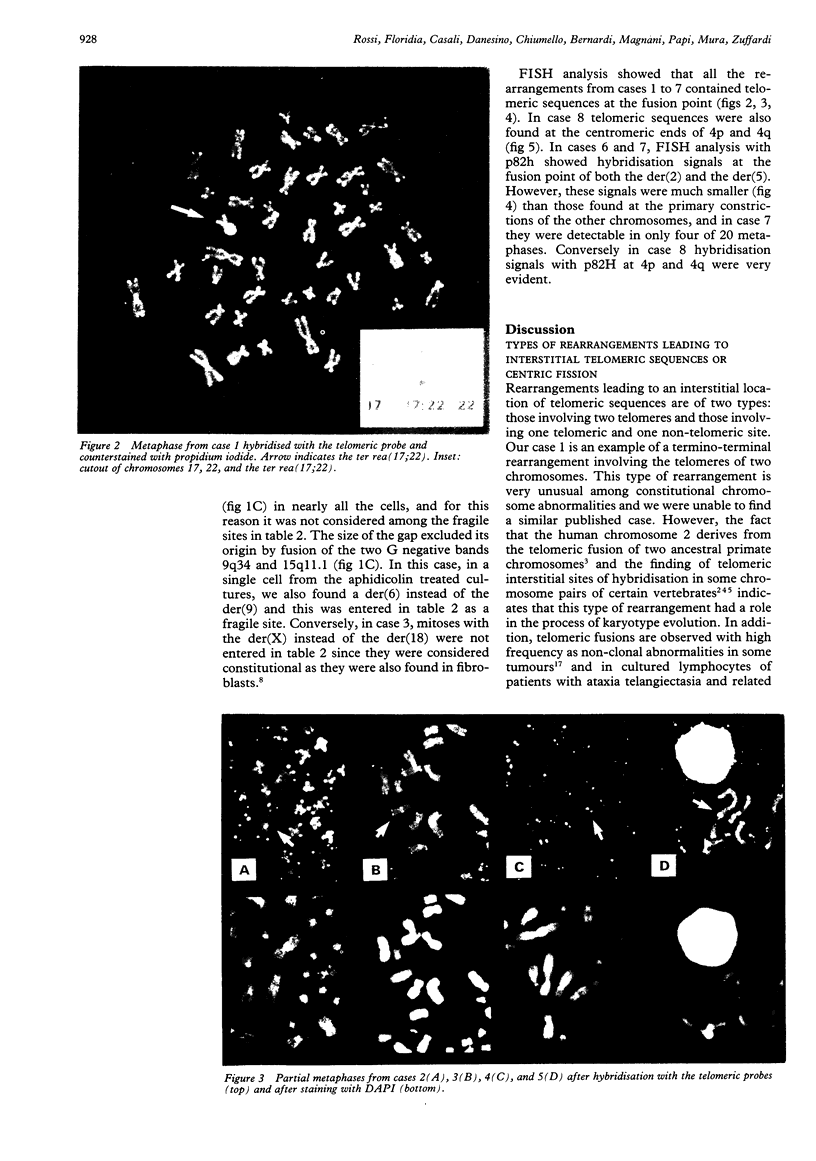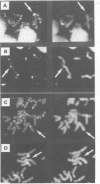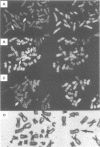Abstract
Using in situ hybridisation, we identified interstitial telomeric sequences in seven chromosomal translocations present in normal and in syndromic subjects. Telomeric sequences were also found at the centromeric ends of a 4p and a 4q caused by centric fission of one chromosome 4. We found that rearrangements leading to interstitial telomeric sequences were of three types: (1) termino-terminal rearrangements with fusion of the telomeres of two chromosomes, of which we report one case; (2) rearrangements in which an acentric fragment of one chromosome fuses to the telomere of another chromosome. We describe four cases of Prader-Willi syndrome with the 15q1-qter transposed to the telomeric repeats of different recipient chromosomes; (3) telomere-centromere rearrangements in which telomeric sequences of one chromosome fuse with the centromere of another chromosome. We describe two examples of these rearrangements in which not only telomeric sequences but also remnants of alphoid sequences were found at the fusion point. Instability at the fusion point of the derivative chromosome was found in the Prader-Willi translocations but we were unable to correlate this instability with culture conditions. The two subjects with the termino-terminal rearrangement and the centric fission respectively have normal phenotypes. The two patients with telomere-centromere fusions were unbalanced for the short arm of an acrocentric chromosome and had failure to thrive; one of them also had dysmorphic facies. We postulate that these phenotypes could be the result of uniparental disomy.
Full text
PDF





Images in this article
Selected References
These references are in PubMed. This may not be the complete list of references from this article.
- Allshire R. C., Gosden J. R., Cross S. H., Cranston G., Rout D., Sugawara N., Szostak J. W., Fantes P. A., Hastie N. D. Telomeric repeat from T. thermophila cross hybridizes with human telomeres. Nature. 1988 Apr 14;332(6165):656–659. doi: 10.1038/332656a0. [DOI] [PubMed] [Google Scholar]
- Anvret M., Wahlström J., Skogsberg P., Hagberg B. Segregation analysis of the X-chromosome in a family with Rett syndrome in two generations. Am J Med Genet. 1990 Sep;37(1):31–35. doi: 10.1002/ajmg.1320370109. [DOI] [PubMed] [Google Scholar]
- Ashley T., Ward D. C. A "hot spot" of recombination coincides with an interstitial telomeric sequence in the Armenian hamster. Cytogenet Cell Genet. 1993;62(2-3):169–171. doi: 10.1159/000133464. [DOI] [PubMed] [Google Scholar]
- Aurias A., Dutrillaux B. A possible new type of chromosome rearrangement: telomere-centromere translocation (tct) followed by double duplication. Hum Genet. 1986 Jan;72(1):25–26. doi: 10.1007/BF00278812. [DOI] [PubMed] [Google Scholar]
- Austin M. J., Collins J. M., Corey L. A., Nance W. E., Neale M. C., Schieken R. M., Brown J. A. Aphidicolin-inducible common fragile-site expression: results from a population survey of twins. Am J Hum Genet. 1992 Jan;50(1):76–83. [PMC free article] [PubMed] [Google Scholar]
- Blackburn E. H. Structure and function of telomeres. Nature. 1991 Apr 18;350(6319):569–573. doi: 10.1038/350569a0. [DOI] [PubMed] [Google Scholar]
- Cattanach B. M. Parental origin effects in mice. J Embryol Exp Morphol. 1986 Oct;97 (Suppl):137–150. [PubMed] [Google Scholar]
- Dallapiccola B., Mastroiacovo P., Gandini E. Centric fission of chromosome no. 4 in the mother of two patients with trisomy 4p. Hum Genet. 1976 Jan 28;31(1):121–125. doi: 10.1007/BF00270409. [DOI] [PubMed] [Google Scholar]
- Di Lernia R., Magnani I., Doneda L., Rizzi R., Larizza L. Cytogenetic instability in a family with gastric cancer recurrence. Cancer Genet Cytogenet. 1987 Aug;27(2):299–310. doi: 10.1016/0165-4608(87)90012-4. [DOI] [PubMed] [Google Scholar]
- Drets M. E., Therman E. Human telomeric 6; 19 translocation chromosome with a tendency to break at the fusion point. Chromosoma. 1983;88(2):139–144. doi: 10.1007/BF00327334. [DOI] [PubMed] [Google Scholar]
- Hastie N. D., Allshire R. C. Human telomeres: fusion and interstitial sites. Trends Genet. 1989 Oct;5(10):326–331. doi: 10.1016/0168-9525(89)90137-6. [DOI] [PubMed] [Google Scholar]
- Kuwano A., Mutirangura A., Dittrich B., Buiting K., Horsthemke B., Saitoh S., Niikawa N., Ledbetter S. A., Greenberg F., Chinault A. C. Molecular dissection of the Prader-Willi/Angelman syndrome region (15q11-13) by YAC cloning and FISH analysis. Hum Mol Genet. 1992 Sep;1(6):417–425. doi: 10.1093/hmg/1.6.417. [DOI] [PubMed] [Google Scholar]
- Lamb J., Harris P. C., Wilkie A. O., Wood W. G., Dauwerse J. G., Higgs D. R. De novo truncation of chromosome 16p and healing with (TTAGGG)n in the alpha-thalassemia/mental retardation syndrome (ATR-16). Am J Hum Genet. 1993 Apr;52(4):668–676. [PMC free article] [PubMed] [Google Scholar]
- Magnani I., Larizza L., Doneda L., Weitnauer L., Rizzi R., Di Lernia R. Malformation syndrome with t(2;22) in a cancer family with chromosome instability. Cancer Genet Cytogenet. 1989 Apr;38(2):223–227. doi: 10.1016/0165-4608(89)90663-8. [DOI] [PubMed] [Google Scholar]
- Maraschio P., Peretti D., Lambiase S., Lo Curto F., Caufin D., Gargantini L., Minoli L., Zuffardi O. A new chromosome instability disorder. Clin Genet. 1986 Nov;30(5):353–365. doi: 10.1111/j.1399-0004.1986.tb01892.x. [DOI] [PubMed] [Google Scholar]
- Meyne J., Baker R. J., Hobart H. H., Hsu T. C., Ryder O. A., Ward O. G., Wiley J. E., Wurster-Hill D. H., Yates T. L., Moyzis R. K. Distribution of non-telomeric sites of the (TTAGGG)n telomeric sequence in vertebrate chromosomes. Chromosoma. 1990 Apr;99(1):3–10. doi: 10.1007/BF01737283. [DOI] [PubMed] [Google Scholar]
- Morin G. B. Recognition of a chromosome truncation site associated with alpha-thalassaemia by human telomerase. Nature. 1991 Oct 3;353(6343):454–456. doi: 10.1038/353454a0. [DOI] [PubMed] [Google Scholar]
- Müller F., Wicky C., Spicher A., Tobler H. New telomere formation after developmentally regulated chromosomal breakage during the process of chromatin diminution in Ascaris lumbricoides. Cell. 1991 Nov 15;67(4):815–822. doi: 10.1016/0092-8674(91)90076-b. [DOI] [PubMed] [Google Scholar]
- Park V. M., Gustashaw K. M., Wathen T. M. The presence of interstitial telomeric sequences in constitutional chromosome abnormalities. Am J Hum Genet. 1992 May;50(5):914–923. [PMC free article] [PubMed] [Google Scholar]
- Pezzolo A., Gimelli G., Cohen A., Lavaggetto A., Romano C., Fogu G., Zuffardi O. Presence of telomeric and subtelomeric sequences at the fusion points of ring chromosomes indicates that the ring syndrome is caused by ring instability. Hum Genet. 1993 Aug;92(1):23–27. doi: 10.1007/BF00216140. [DOI] [PubMed] [Google Scholar]
- Robinson W. P., Bottani A., Xie Y. G., Balakrishman J., Binkert F., Mächler M., Prader A., Schinzel A. Molecular, cytogenetic, and clinical investigations of Prader-Willi syndrome patients. Am J Hum Genet. 1991 Dec;49(6):1219–1234. [PMC free article] [PubMed] [Google Scholar]
- Schmid M., Feichtinger W., Jessberger A., Köhler J., Lange R. The fragile site (16) (q22). I. Induction by AT-specific DNA-ligands and population frequency. Hum Genet. 1986 Sep;74(1):67–73. doi: 10.1007/BF00278788. [DOI] [PubMed] [Google Scholar]
- Spence J. E., Perciaccante R. G., Greig G. M., Willard H. F., Ledbetter D. H., Hejtmancik J. F., Pollack M. S., O'Brien W. E., Beaudet A. L. Uniparental disomy as a mechanism for human genetic disease. Am J Hum Genet. 1988 Feb;42(2):217–226. [PMC free article] [PubMed] [Google Scholar]
- Sutherland G. R., Parslow M. I., Baker E. New classes of common fragile sites induced by 5-azacytidine and bromodeoxyuridine. Hum Genet. 1985;69(3):233–237. doi: 10.1007/BF00293031. [DOI] [PubMed] [Google Scholar]
- Temple I. K., Cockwell A., Hassold T., Pettay D., Jacobs P. Maternal uniparental disomy for chromosome 14. J Med Genet. 1991 Aug;28(8):511–514. doi: 10.1136/jmg.28.8.511. [DOI] [PMC free article] [PubMed] [Google Scholar]
- Voss R., Ben-Simon E., Avital A., Godfrey S., Zlotogora J., Dagan J., Tikochinski Y., Hillel J. Isodisomy of chromosome 7 in a patient with cystic fibrosis: could uniparental disomy be common in humans? Am J Hum Genet. 1989 Sep;45(3):373–380. [PMC free article] [PubMed] [Google Scholar]
- Wang J. C., Passage M. B., Yen P. H., Shapiro L. J., Mohandas T. K. Uniparental heterodisomy for chromosome 14 in a phenotypically abnormal familial balanced 13/14 Robertsonian translocation carrier. Am J Hum Genet. 1991 Jun;48(6):1069–1074. [PMC free article] [PubMed] [Google Scholar]
- Waye J. S., Mitchell A. R., Willard H. F. Organization and genomic distribution of "82H" alpha satellite DNA. Evidence for a low-copy or single-copy alphoid domain located on human chromosome 14. Hum Genet. 1988 Jan;78(1):27–32. doi: 10.1007/BF00291229. [DOI] [PubMed] [Google Scholar]
- Wiley J. E., Meyne J., Little M. L., Stout J. C. Interstitial hybridization sites of the (TTAGGG)n telomeric sequence on the chromosomes of some North American hylid frogs. Cytogenet Cell Genet. 1992;61(1):55–57. doi: 10.1159/000133368. [DOI] [PubMed] [Google Scholar]
- Willard H. F. Centromeres--primary constrictions are primarily complicated. Hum Mol Genet. 1992 Dec;1(9):667–668. doi: 10.1093/hmg/1.9.667. [DOI] [PubMed] [Google Scholar]
- Yu G. L., Blackburn E. H. Developmentally programmed healing of chromosomes by telomerase in Tetrahymena. Cell. 1991 Nov 15;67(4):823–832. doi: 10.1016/0092-8674(91)90077-c. [DOI] [PubMed] [Google Scholar]







